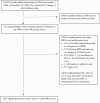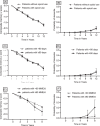Prescription opioid use and cognitive function in older adults with chronic pain: A population-based longitudinal cohort study
- PMID: 39989238
- PMCID: PMC11848163
- DOI: 10.1002/alz.70002
Prescription opioid use and cognitive function in older adults with chronic pain: A population-based longitudinal cohort study
Abstract
Introduction: Whether prescription opioid exposure, duration, and dose are associated with cognitive function remains inconclusive.
Methods: A longitudinal cohort among 3097 older adults with chronic pain and without dementia was conducted using Health and Retirement Study (HRS) linked to Medicare data from 2006 to 2020. Prescription opioid exposure, cumulative use for ≥ 90 days, and high-dose use (≥ 90 morphine milligram equivalents [MME] daily) were assessed biennially. Memory score and dementia probability were derived from HRS cognitive measures and analyzed using linear mixed-effects models.
Results: Adjusted memory decline and dementia probability were not statistically different between patients with (vs. without) opioid exposure and between patients with cumulative use for ≥ 90 days (vs. < 90 days) but were higher between participants with high-dose opioid use (vs. low-dose) at the end of the follow-up.
Discussion: Prescription opioid exposure and duration were not associated, but high-dose opioid use was associated with greater memory decline and dementia probability.
Highlights: Opioid use versus no use was not related to memory decline and dementia probability. Long-term opioid use was not related to memory decline and dementia probability. High-dose opioid use was related to greater memory decline and dementia probability.
Keywords: dementia probability; memory decline; older adults; prescription opioid use.
© 2025 The Author(s). Alzheimer's & Dementia published by Wiley Periodicals LLC on behalf of Alzheimer's Association.
Conflict of interest statement
All authors have no conflicts of interest. Author disclosures are available in the supporting information.
Figures


References
-
- Hubbard R, Farrington P, Smith C, Smeeth L, Tattersfield A. Exposure to tricyclic and selective serotonin reuptake inhibitor antidepressants and the risk of hip fracture. Am J Epidemiol. 2003;158:77‐84. - PubMed
MeSH terms
Substances
Grants and funding
LinkOut - more resources
Full Text Sources
Medical
Miscellaneous

